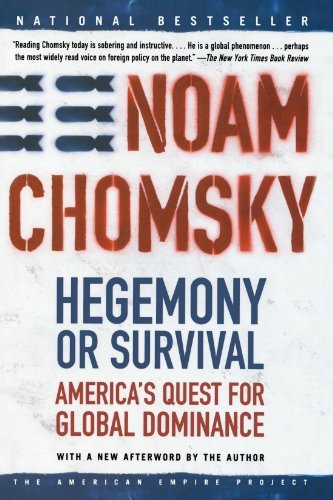
Hegemony or Survival: America's Quest for Global Dominance
Book Description
Power hangs in the balance, as a relentless quest for dominance shapes the fate of nations. In "Hegemony or Survival," Noam Chomsky uncovers the stark reality behind America’s global ambitions, revealing the strategies and consequences of its imperial drive. From military interventions to economic manipulation, the stakes soar as millions suffer under the weight of geopolitical maneuvering. With chilling clarity, Chomsky challenges the notion of security, exposing the conflict between survival and hegemony. As the world teeters on the brink, one question looms large: Will humanity rise above power struggles, or are we destined to repeat the same catastrophic mistakes?
Quick Book Summary
"Hegemony or Survival" by Noam Chomsky is a critical analysis of U.S. foreign policy, focusing on its pursuit of global dominance in the post-World War II era. Chomsky argues that America's quest for hegemony—manifested through military interventions, covert operations, and economic control—poses a threat to global stability and human survival. He exposes how rhetoric around security and democracy often serves to justify aggressive strategies that undermine international law and sovereignty. Chomsky challenges readers to question dominant narratives, highlighting the roles of media and public opinion in perpetuating imperial ambitions. Ultimately, he warns that unless humanity confronts the dangers of unchecked power, the prospects for peace and survival remain grim.
Summary of Key Ideas
Table of Contents
America’s Imperial Doctrine
In tracing the roots of America's global ambitions, Chomsky explores the post-World War II doctrine that established the U.S. as a self-proclaimed guardian of global order. The book contends that American policymakers have consistently viewed hegemony as essential for national security, justifying interventionist policies across Latin America, the Middle East, and beyond. This guiding doctrine, Chomsky argues, places U.S. interests above international norms and fosters a culture where international law is subordinate to American power.
Mechanisms of Global Control
Chomsky delves into the tools and tactics employed to maintain dominance. These mechanisms include overt military intervention, support for authoritarian regimes, and the manipulation of economic instruments like sanctions and trade policies. He details how clandestine operations, coups, and propaganda are employed to shape the political landscape of other nations, ensuring compliance with U.S. strategic and economic goals. The employment of these mechanisms often results in destabilization, human suffering, and the erosion of democratic institutions abroad.
The Role of Media and Propaganda
A significant component of Chomsky’s critique revolves around the role of the media and public discourse. He argues that corporate and state-aligned media serve as instruments of propaganda, manufacturing consent among the U.S. populace. Through selective reporting, omission, and framing, mainstream narratives obscure the realities of foreign interventions and the consequences for affected populations. This system curtails genuine democratic participation by keeping the public uninformed or misinformed about the true costs and motives of U.S. actions.
Consequences for Democracy and Survival
The cumulative impact of these policies, as Chomsky illustrates, is the erosion of democracy both at home and internationally. He notes that the prioritization of hegemony invariably leads to moral and ethical compromises, undermining respect for human rights and international law. The specter of nuclear war, environmental destruction, and perpetual conflict underscores the existential risks posed by unchecked imperial ambitions. Chomsky warns that the pursuit of dominance is inherently unsustainable and threatens the very survival of humanity.
Prospects for Change and Resistance
Chomsky concludes by considering the possibilities for change and resistance. He points to global civil society, grassroots movements, and transnational activism as sources of hope. The responsibility to challenge hegemony and advocate for a more just and lawful global order, he argues, falls not just on governments but on ordinary citizens worldwide. Chomsky calls for critical engagement, informed dissent, and a renewed commitment to survival over domination, urging humanity to choose a path that prioritizes peace and cooperative security.
Download This Summary
Get a free PDF of this summary instantly — no email required.





